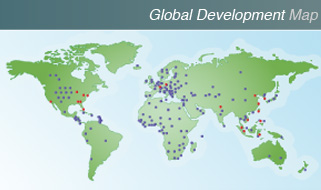
Neuralstem could seek partner for Phase II depression small molecule; to develop stem cell therapy solo - CEO
Neuralstem (NYSEMKT:CUR) will seek a partner for its Phase II-ready small molecule NSI-189 for major depressive disorder (MDD) and other psychiatric indications, according to CEO Richard Garr. The company will start a Phase II trial by YE14 and data could be due by late 2016, which could be a catalyst for further discussions, he added.
The partnership would allow Neuralstem to focus on development of its stem cell therapy NSI-566 for neurology indications without a partner, the CEO noted.
A Phase Ib trial of NSI-189 to treat MDD was completed in February and there have been preliminary partnership discussions but nothing concrete, said Garr.
Neuralstem is committed to completing a Phase II trial in MDD on its own and is looking to file an IND, either in the late summer or early 3Q14 to start the trial by the year end, he noted.
NSI-189 is the lead compound in Neuralstem's neurogenic small molecule drug platform, which the company plans to develop into orally administered drugs for MDD and other psychiatric and cognitive disorders such as traumatic brain injury, Alzheimer's disease, and post-traumatic stress disorder (PTSD), according to a company press release.
The company will consider several deal structures and prefers a co-development agreement; however, Neuralstem is not interested in any co-marketing arrangements, said Garr. Neuralstem is only interested in partnership with a company that is willing to explore the full potential of NSI-189 as a neurogenic agent in all potential indications. The company is interested in striking a global deal rather than exploring regional opportunities, he added.
Neuralstem added Catherine Sohn to its board of directors in January who came from business development at GlaxoSmithKline(LON:GSK), noted Garr, adding with her contacts, she may aid in the construction of a partnership deal.
Dr Maurizio Fava, professor of Psychiatry, Harvard Medical School, Boston, Massachusetts, is likely to be the principal investigator for the Phase II MDD trial, said Garr. The trial will take approximately 18 months with data available six months after that, so data may be obtained between late 2016 and early 2017. As the trial will take place at the Harvard Medical School, Neuralstem will use Harvard’s own team to run the trial, he noted.
Stem cell therapy
Neuralstem intends to develop its Phase II stem cell therapy, NSI-566, to market in a number of neurology indications, said Garr. NSI-566 is to complete a Phase II dosing trial in amyotrophic lateral sclerosis (ALS) by the end of June and the company is confident a Phase III will follow shortly after. The aim is to get regulatory approval for the trial by YE14 and begin the Phase III trial early next year, he said.
NSI-566 is a treatment derived from human spinal cord stem cells which is directly injected into the gray matter of the patient’s spinal cord and is under investigation for the treatment of ALS, ischemic stroke, spinal cord injury multiple sclerosis and other conditions, according to the company website.
Neuralstem has approximately USD 33m in the bank and has a monthly burn rate of about USD 800,000 which means the company is well financed for the time being, said Garr. The National Institute of Health (NIH) and the ALS Association have provided grants to assist the completion of the Phase II trial and Neuralstem is hoping to receive similar support for the Phase III trial, he added.
Neuralstem’s market cap is USD 350m.
by Hamish McDougall in London (April 25, 2014)
 Sign up for Breaking News Email Alerts
Sign up for Breaking News Email Alerts


